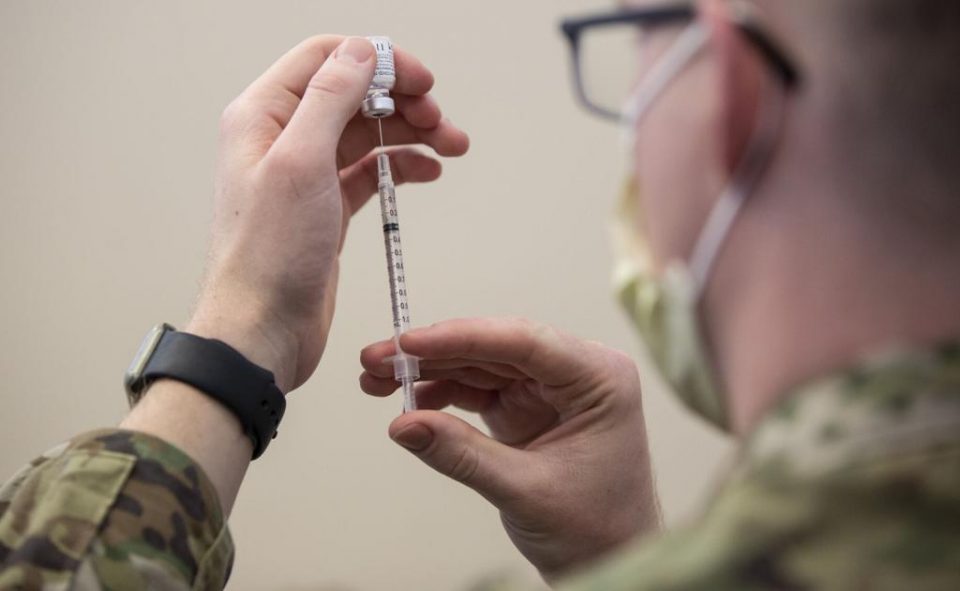TRAVERSE CITY — A change in the way vaccines are distributed by the state of Michigan has made getting them in arms even more unpredictable.
Hospitals and regional health departments are no longer able to request the number of vaccine doses they need, something they have done since the vaccines were approved, said Nate Alger, Grand Traverse County administrator.
Instead, doses are allocated by the state based on population and risk factors.
The change was made because what was being requested far exceeded available doses, said Lisa Peacock, health officer for the Benzie Leelanau District Health Department and the Health Department of Northwest Michigan.
Peacock said the Michigan Department of Health and Human Services has also recognized the need for a predictable number of doses each week, with allocations based on a formula of eligible individuals and risk factors as determined by the Centers for Disease Control Social Vulnerability Index.
“We have not yet seen the data they are using for this calculation,” Peacock said.
Alger said the change is making scheduling more difficult.
Vaccines were previously ordered on Thursday, with departments knowing how many doses they would receive by early Friday. That allowed them to schedule appointments for the following week.
The Grand Traverse County Health Department partners with Northwestern Michigan College to host clinics at the Hagerty Center and with the National Guard to give the shots. Multiple volunteers are also lined up and ready to work the clinics, Alger said.
The county does not schedule appointments until they know the number of doses they’ll have, he said.
“Our schedule is dependent on what we have,” Alger said. “We don’t give out appointments without a vaccine behind it.”
The county received 2,150 doses last week and 3,200 this week, all of which were used to give first and second doses of the two-part vaccine.
People who fall into the state guidelines for a vaccine can visit grandtraverse.org where a link goes live for people to choose a date and time. Information on who is eligible is on the website.
The link will open at 1 p.m. Monday, though only about 1,000 doses will be available. The county was not told until late Friday how many doses there would be, Alger said.
Appointments are first come, first served and when they have all been filled the link closes. In each of the last two weeks appointments filled up in about an hour, said Alger, who does not know when the link will open again.
Some people are also calling the county to ask why they can’t get a vaccine when their friend or family member downstate has already gotten one.
Alger said there are a lot of long-term care facilities, doctors offices and a hospital in this county that account for some of the inconsistencies being seen from county to county. That made the first phase of the rollout — frontline healthcare workers and nursing home residents — a lot longer than it may have been in other areas.
As of Friday, Munson Healthcare had given 19,882 first and second doses at clinics in its seven hospitals across the region. People can call Munson at 231-935-7468 to schedule an appointment. Munson does not have an online option and is not doing pre-registration.
Munson also reported 31 people were hospitalized with COVID-19 across its healthcare system, with 25 at the Traverse City hospital. That number is down from 39 total the previous week and 46 the week before.
“I’m happy to report that our numbers are starting to stabilize across the Munson Healthcare region,” said Dianne Michalek, vice president of communications.Munson and health departments still are innoculating frontline workers with first and second doses and essential workers such as police, firefighters, jail and corrections staff, childcare workers and teachers and those older than 65.
There are 132,000 people 65 and older in the Munson region, so clinics began by vaccinating those older than 90, with the age lowered every few days. This week the criteria expanded to those 80 years and older, Michalek said.
People can make vaccine appointments with Munson or with their regional health department, but are asked not to make two appointments to ensure the vaccine supply is properly allocated.
Infections caused by several new variants of the novel coronavirus are also making people anxious, said Dr. Mark Cannon, an infectious disease specialist with Munson.
The variants that were first seen in the United Kingdom, South Africa and Brazil are being identified in the United States and in Michigan, where health officials reported earlier this week that several people in Wayne and Washtenaw counties are infected.
The variants are not surprising because coronaviruses mutate, Cannon said.
“There are literally thousands of variants, but at any given time I expect there will be a few, a handful, that are the most concerning,” Cannon said.
The big questions people are asking is whether the vaccine will still work and if the tests will pick up the new variants, Cannon said. Every variant will be looked at to answer those questions, he said.
The UK variant is covered by the vaccine, while the variant seen in South Africa is being looked at to see if it will need a booster, or a third shot, he said.
“Anyone who knows anything about virology is not surprised that we have mutations and that the vaccine is going to have to be tweaked,” Cannon said. “That is a given.”


